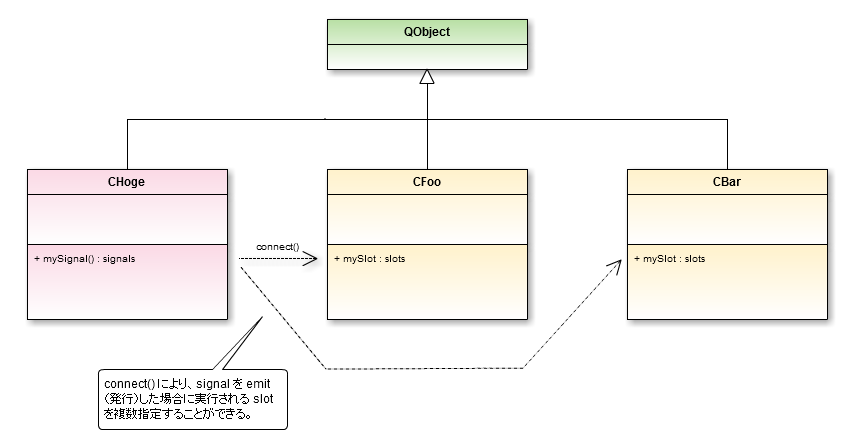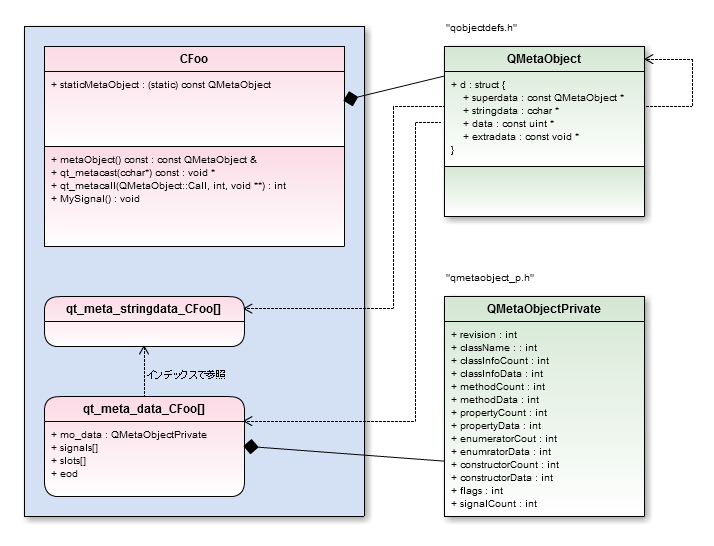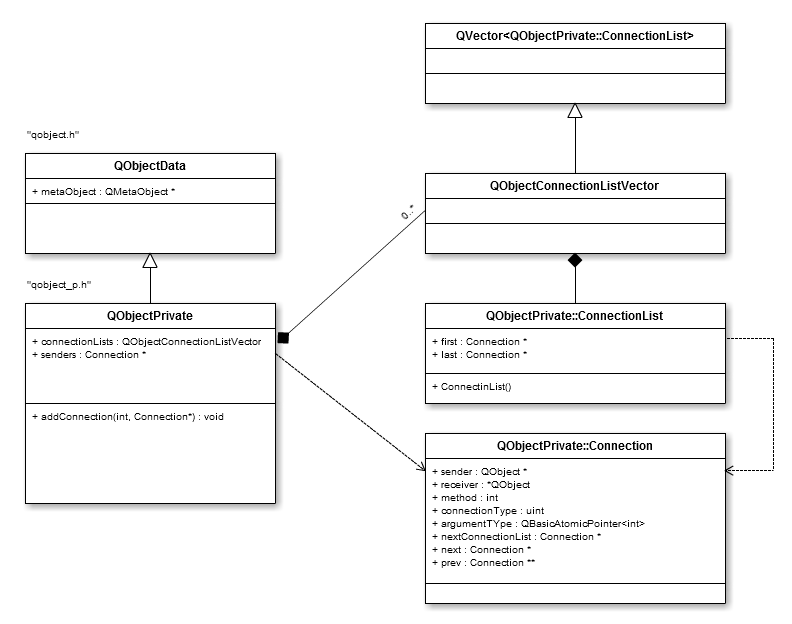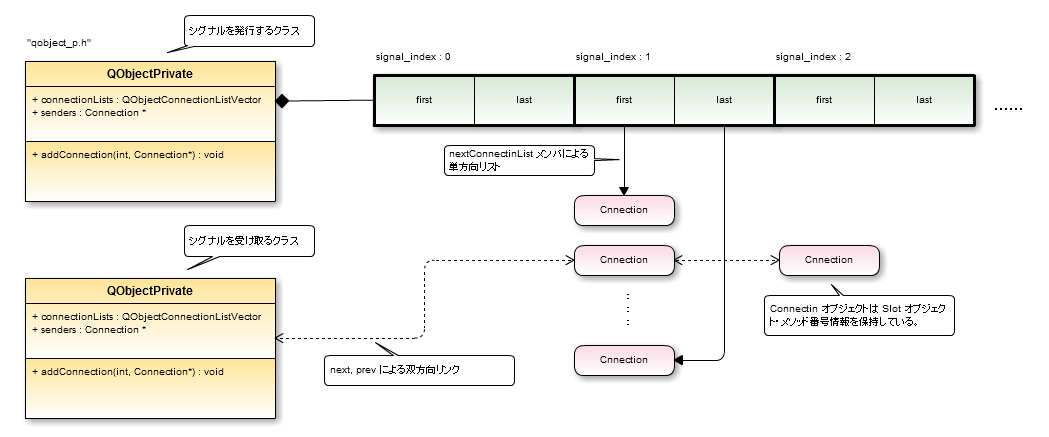実際のシグナル発行処理部分
"C:\Qt\2010.04\qt\src\corelib\kernel\qobject.cpp"
指定オブジェクトの指定番号のシグナルにコネクトされているスロットをコールする。
コネクトタイプには Qt::QueuedConnection などがあるので、それぞれで処理を分けている。
void QMetaObject::activate(QObject *sender, const QMetaObject *m, int local_signal_index,
void **argv)
{
int signalOffset;
int methodOffset;
computeOffsets(m, &signalOffset, &methodOffset);
int signal_index = signalOffset + local_signal_index;
if (!sender->d_func()->isSignalConnected(signal_index))
return; // nothing connected to these signals, and no spy
if (sender->d_func()->blockSig)
return;
int signal_absolute_index = methodOffset + local_signal_index;
void *empty_argv[] = { 0 };
if (qt_signal_spy_callback_set.signal_begin_callback != 0) {
qt_signal_spy_callback_set.signal_begin_callback(sender, signal_absolute_index,
argv ? argv : empty_argv);
}
QMutexLocker locker(signalSlotLock(sender));
QThreadData *currentThreadData = QThreadData::current();
QObjectConnectionListVector *connectionLists = sender->d_func()->connectionLists;
if (!connectionLists) {
locker.unlock();
if (qt_signal_spy_callback_set.signal_end_callback != 0)
qt_signal_spy_callback_set.signal_end_callback(sender, signal_absolute_index);
return;
}
++connectionLists->inUse;
if (signal_index >= connectionLists->count()) {
signal_index = -2; //for "all signals";
}
do {
QObjectPrivate::Connection *c = connectionLists->at(signal_index).first;
if (!c) continue;
// We need to check against last here to ensure that signals added
// during the signal emission are not emitted in this emission.
QObjectPrivate::Connection *last = connectionLists->at(signal_index).last;
do {
if (!c->receiver) // dissconnect 済みの場合
continue;
QObject * const receiver = c->receiver;
// determine if this connection should be sent immediately or
// put into the event queue
if ((c->connectionType == Qt::AutoConnection
&& (currentThreadData != sender->d_func()->threadData
|| receiver->d_func()->threadData != sender->d_func()->threadData))
|| (c->connectionType == Qt::QueuedConnection)) {
// レシーバ側のキューに積まれ、イベントループに戻ったときに実行される
queued_activate(sender, signal_absolute_index, c, argv ? argv : empty_argv);
continue;
} else if (c->connectionType == Qt::BlockingQueuedConnection) {
// レシーバ側のキューに積まれ、イベントループに戻ったときに実行される
// 実行が終わるまでブロッキング
blocking_activate(sender, signal_absolute_index, c, argv ? argv : empty_argv);
continue;
}
const int method = c->method;
QObjectPrivate::Sender currentSender;
const bool receiverInSameThread = currentThreadData == receiver->d_func()->threadData;
QObjectPrivate::Sender *previousSender = 0;
if (receiverInSameThread) {
currentSender.sender = sender;
currentSender.signal = signal_absolute_index;
currentSender.ref = 1;
previousSender = QObjectPrivate::setCurrentSender(receiver, ¤tSender);
}
locker.unlock();
if (qt_signal_spy_callback_set.slot_begin_callback != 0) {
qt_signal_spy_callback_set.slot_begin_callback(receiver,
method,
argv ? argv : empty_argv);
}
#if defined(QT_NO_EXCEPTIONS)
metacall(receiver, QMetaObject::InvokeMetaMethod, method, argv ? argv : empty_argv);
#else
QT_TRY {
metacall(receiver, QMetaObject::InvokeMetaMethod, method, argv ? argv : empty_argv);
} QT_CATCH(...) {
locker.relock();
if (receiverInSameThread)
QObjectPrivate::resetCurrentSender(receiver, ¤tSender, previousSender);
--connectionLists->inUse;
Q_ASSERT(connectionLists->inUse >= 0);
if (connectionLists->orphaned && !connectionLists->inUse)
delete connectionLists;
QT_RETHROW;
}
#endif
if (qt_signal_spy_callback_set.slot_end_callback != 0)
qt_signal_spy_callback_set.slot_end_callback(receiver, method);
locker.relock();
if (receiverInSameThread)
QObjectPrivate::resetCurrentSender(receiver, ¤tSender, previousSender);
if (connectionLists->orphaned)
break;
} while (c != last && (c = c->nextConnectionList) != 0);
if (connectionLists->orphaned)
break;
} while (signal_index >= 0 && (signal_index = -1)); //start over for -1 (all signal)
--connectionLists->inUse;
Q_ASSERT(connectionLists->inUse >= 0);
if (connectionLists->orphaned) {
if (!connectionLists->inUse)
delete connectionLists;
} else {
sender->d_func()->cleanConnectionLists();
}
locker.unlock();
if (qt_signal_spy_callback_set.signal_end_callback != 0)
qt_signal_spy_callback_set.signal_end_callback(sender, signal_absolute_index);
}
スロットコールがキューイングされる場合とブロッキングされる場合の処理:
static void queued_activate(QObject *sender, int signal, QObjectPrivate::Connection *c,
void **argv, QSemaphore *semaphore = 0)
{
if (!c->argumentTypes && c->argumentTypes != &DIRECT_CONNECTION_ONLY) {
QMetaMethod m = sender->metaObject()->method(signal);
int *tmp = queuedConnectionTypes(m.parameterTypes());
if (!tmp) // cannot queue arguments
tmp = &DIRECT_CONNECTION_ONLY;
if (!c->argumentTypes.testAndSetOrdered(0, tmp)) {
if (tmp != &DIRECT_CONNECTION_ONLY)
delete [] tmp;
}
}
if (c->argumentTypes == &DIRECT_CONNECTION_ONLY) // cannot activate
return;
int nargs = 1; // include return type
while (c->argumentTypes[nargs-1])
++nargs;
int *types = (int *) qMalloc(nargs*sizeof(int));
Q_CHECK_PTR(types);
void **args = (void **) qMalloc(nargs*sizeof(void *));
Q_CHECK_PTR(args);
types[0] = 0; // return type
args[0] = 0; // return value
for (int n = 1; n < nargs; ++n)
args[n] = QMetaType::construct((types[n] = c->argumentTypes[n-1]), argv[n]);
QCoreApplication::postEvent(c->receiver, new QMetaCallEvent(c->method,
sender,
signal,
nargs,
types,
args,
semaphore));
}
static void blocking_activate(QObject *sender, int signal, QObjectPrivate::Connection *c, void **argv)
{
if (QThread::currentThread() == c->receiver->thread()) {
qWarning("Qt: Dead lock detected while activating a BlockingQueuedConnection: "
"Sender is %s(%p), receiver is %s(%p)",
sender->metaObject()->className(), sender,
c->receiver->metaObject()->className(), c->receiver);
}
#ifdef QT_NO_THREAD
queued_activate(sender, signal, c, argv);
#else
QSemaphore semaphore;
queued_activate(sender, signal, c, argv, &semaphore);
QMutex *mutex = signalSlotLock(sender);
mutex->unlock();
semaphore.acquire();
mutex->lock();
#endif
}




